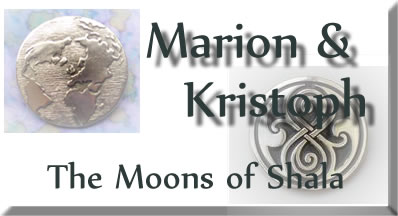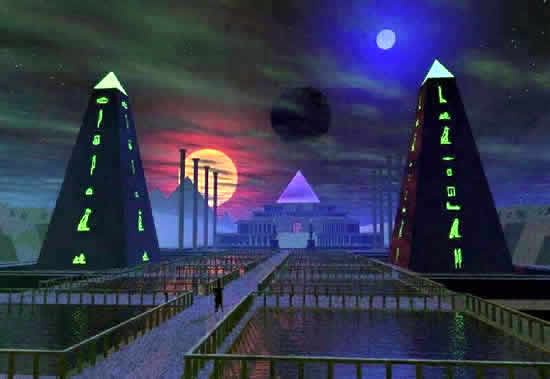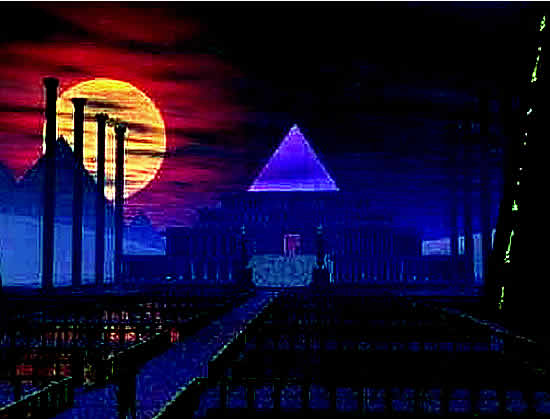

It was an hour before midnight on Shala, the planet of the moons. There were twenty-eight hours in the planetary rotation commonly known as a day, so that it was much later than it might be elsewhere. Marion and Rodan had both taken a long nap earlier in the evening in order to be ready for this all-important ceremony.
There were eight moons orbiting Shala, which was a lot for a planet of its size. Three of them were full on this night, one red, one black and one small bright white one. They rose in a diagonal line that astronomers marvelled at because it was always exactly a straight line through the centre of all three moons.
Tonight, the black moon would rise with its centre exactly above the Temple of the Moon. That happened once every four years and was a very grand occasion.
The Temple was the biggest structure on Shala. The base of it was a huge ziggurat of stone. It was a full quarter of a mile around its perimeter and the walls leaned inwards by exactly fifteen degrees as it rose to its full thousand feet. Atop the ziggurat was a massive six sided crystal pyramid that glowed softly from within by day and by night.
A wide, mile long pavement stretched from the citadel of Shala to the Temple of the Moon. At intervals along the way there were huge black obelisks with Shalaean hieroglyphs that shone with an inner light. Between them were pools of water that reflected a pale blue sky by day but were now black as obsidian except where they perfectly reflected the glyphs.
“In fact, the glyphs only make sense reflected in the pools,” Kristoph told her as they looked at the view from the steps of the citadel. “They were designed that way, so that they’re read in contemplation.”
“That explains it, then,” Marion said. “I was puzzled about them. I’ve read the glyphs all along the great promenade and in the throne room, because of the TARDIS translating things for me. But I couldn’t read those.”
“They’re parts of an old Shalaen poem in praise of the moon.”
“Of course.”
For millennia, the Shala had worshipped their moons as gods. They had a rich, beautiful culture based on the belief that the movement of the orbs in the sky affected their ordinary lives down on the planet. When they became sufficiently advanced to understand about the universe around them the actual worship of the moons began to die out, but they kept all of the stories and poetry, the architecture and the rituals that went with it as part of their culture and heritage.
Marion had been puzzled by that to begin with. It was like people on Earth giving up Christianity but still going to church on a Sunday and keeping huge cathedrals just for show. She expected it to be nothing but empty, pointless ritual.
But it wasn’t. In the few days they had been visiting the planet she had thoroughly enjoyed visiting all of the smaller temples where both professional and amateur acting companies put on daily performances of the epic poems and stories that were associated with the former worship. It was all beautifully colourful with costumes and props made of paper and silk scraps. The stories tended to be morality tales with virtue overcoming vice in the best possible ways, so even though the Shalaen people didn’t believe in the moon deities the audience still learnt important lessons for living a good life.
“Lady Moon, rising red in the east; Shine upon us and be increased:
Lord Moon, rising in the west; black as dusk, husband to the red:
Moon Child, rising in the north; pure white, innocence abroad.”
Marion read the words in the pool nearest to where she was standing.
“It’s a fertility poem,” she said with a laugh. “The lady moon is seduced by the Lord Moon and the child is the result.”
“Stands to reason,” Kristoph noted. “One thing leads to another in nature – and in poetry.”
In the pool on the right hand side, the poem was a little longer, even though it took the same number of glyphs to tell it.
“Moon Rises High Into The Sky
Moon Is Red
Moon Is Bright.
Moon Is Full
Moon Shines Onto Shala
Brightens My Path.
“That one is an exhortation to follow the path of light,” Marion interpreted. “Follow the moon’s example and you can’t go wrong.”
“Something like that. We have a similar poem about Pazithi Gallifreya, but only about her silver aspect. I assume the light from the bronze aspect leads people astray.”
Marion smiled at the thought. She looked at the red moon of Shala, the one personified as a Lady. She represented motherhood and fertility, as well as grace and goodness.
The dark moon was personified in other pools of glyphs as a powerful man who could anger quickly if crossed but who stood in protection of the Lady and the Child moons.
Just as a father ought to be, Marion thought.
And the child, of course, was the personification of innocence and purity, untouched by negative thoughts and acts of meanness.
“Catholics would get it,” Marion said as she thought about the poems and the way the moons were portrayed in them. “Madonna and child and the Lord God protecting them.”
“Yes,” Kristoph noted.
“Does that mean….” Marion was thinking things through. “People here have never heard of Christianity, of the bible story of Jesus. People on Earth have never heard of Shala and its moons. They are completely different races even though they look alike in most respects. Yet they have such similar ideas in their culture. Is there something… some deep universal memory that somehow connects people of all kinds?”
“I asked that question many times before. The answer from my elders and betters has always been ‘no’, but I’m not sure I believe them. There are too many ‘coincidences’ in the universe for them to BE coincidences. I think you’ve put your finger on a great, wonderful mystery that mortals, even Time Lords, are not meant to fully understand.”
Marion felt a little proud of herself for working out something quite that deep.
She was trying to read the poems in the next two pools when a loud trumpet sounded. The procession was moving forward. Unlike so many places where she and Kristoph and the president and government had been first in line, the most important people were the last to set off in this procession. At the head of it were the moon dancers in their luminous costumes that flashed and whirled in the moonlight. Behind them came the performers of the Moon Mystery, one of the dramatised epic poems that were performed in the temples. They were going to give their most colourful and spectacular performance in the Great Temple tonight.
After that came the priests and priestesses in their most amazing ceremonial robes. The fact that there were men and women employed in such a role when there was no actual worship any more struck Marion as odd when she first heard about them. But as she learnt more about the Shalaen way of life she came to understand what it was about.
Yes, the priests and priestesses were assigned to each of the Temples in the city, but not to conduct services of worship of the usual sort. They did officiate at weddings and funerals and the naming ceremonies of newborn children, and in all of those occasions there were ancient forms of words referring to the Lords of the Moon, but they were kept purely for their poetry.
The priests also kept a room open in the temples for people who were emotionally lost or lonely or troubled in some way and were trained to give guidance. They provided meals for the hungry and shelter for the homeless – not that many people were either for very long in a society that had solved most of its social problems.
In short, the priests and priestesses provided a social backbone of Shalean life. Marion thought it was an excellent idea and approved thoroughly of how it worked.
The children of Shala – or a representative group of them who had been allowed to stay up late for the ceremony – came next. The girls were in lovely white dresses that shone in the moonlight and the boys in white shirts and loose trousers much like the Indian Shalwar Kameez. They all carried baskets of white moonflowers They paid homage to the Child Moon, of course, in the colour of their clothes and flowers, and the spotless innocence of their youth.
Rodan was among them. Marion couldn’t tell which she was. Nor could Kristoph without a lifesigns monitor that could differentiate between species, but she had been granted the honour of a place among the children and had been fitted with an iridescent white dress and her own basket of flowers. She had been excited to take part in the procession.
Marion was a little excited herself. After the representatives of the people of Shala in their colourful ceremonial costumes came the government ministers in robes of black and red. Kristoph was dressed in the same though he wore a large gold Seal of Rassilon medallion and his cloak had the same symbol on the shoulder where it fastened.
Marion was in a dress of shimmering red, of course, along with all the important women. Her cloak was crimson and fastened with the Seal of Rassilon to mark her as the First Lady of the Dominion homeworld, but she was quite proud to take part in the ceremony on equal terms with the Shalaens.
She was proud to have made it down the wide steps at the front of the Citadel with her head held high and without tripping over the hem of her gown. That was down to the countless diplomatic balls and civic receptions she had attended over the years since she had been Kristoph’s wife. Before then she would have been too terrified to take the first step without looking down at her feet to be sure.
Kristoph was beside her all the way. He was her Lord of Time the way that black moon was the Lord over the Lady Moon, not in an oppressive, daunting way, but as a protector and nurturer.
They walked together in a slow, processional style, halting now and again because the Moon dancers were performing part of their dance. It gave Marion a chance to look at some more of the reflected glyphs with their homages to the Moons of Shala.
“I keep thinking of songs,” Marion admitted in a low whisper. “Moondance, and Bad Moon Rising keep mixing up in my head.”
“Moondance would fit in well here,” Kristoph said. “Except I don’t think they have a glyph for the word ‘fantabulous’.”
Marion tried not to laugh, though nobody would have minded if she did. This was an important night in the Shalaen calendar but it was a celebration not a solemn occasion. It was all right to laugh.
“Bad Moon Rising doesn’t fit at all,” Marion said. “All of the moons of Shala are perfectly benevolent. The only one that brings anything close to ‘nasty weather’ is the Corn Moon that heralds the autumn rains.”
“Yes, they are blessed with a benign climate,” Kristoph agreed. He looked up at the clear, deep midnight blue sky with silver stars forming unfamiliar constellations. This was a perfect night for the largely open air ceremony with the warmth of a fine day still to dissipate. There was a sweet smell of incense from burning sticks carried by some of the people who walked in the procession. It was a pleasant smell, one unfamiliar to Kristoph. Incense didn’t form a part of Gallifreyan ceremonies.
The moon dancers has ascended to the base of the pyramid, now. They spread along the front face, their bodies silhouetted against its luminescence as they performed the next sequence of the dance. The actors went up the steps to the temple and lit torches within to illuminate their performance. The priests and priestesses gathered either side while the children sat on the steps in front, their baskets on their knees. The ordinary people and the VIPs alike stood to watch the performers and to welcome the rising moons on this night when they were in such a perfect alignment with the Child Moon’s centre directly above the apex of the pyramid.
It seemed incredible that such a lovely, colourful, musical, visual display should be put on for such a simple reason, without any prayers to any gods or any expectation of favours or miracles. But it was exactly what it was all about, and nobody felt it wasn’t a perfectly good reason for it.
“We need ceremonies like this on Gallifrey,” Marion said. “And on Earth, for that matter. Just for the joy of watching the moons rise.”
“I’ll table a motion when the High Council are next in session,” Kristoph promised. “But I suspect Gold Usher will think it frivolous. We shall just have to come to Shala again next time the moons rise this way.”
“I’ll hold you to that,” Marion said happily before giving her attention to the play being performed in the great temple and the dancers above accompanying it, and concluding in her contended mind that it really was a ‘marvellous night for a Moondance’.

 |
 |
 |